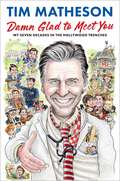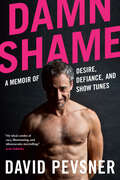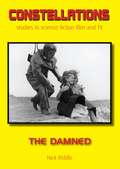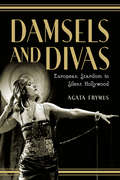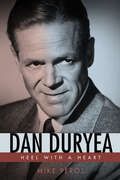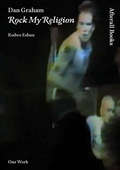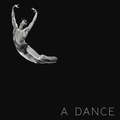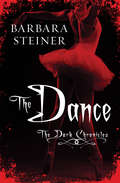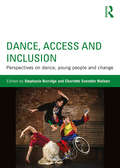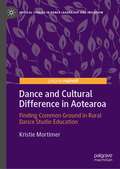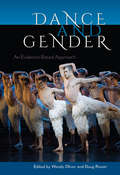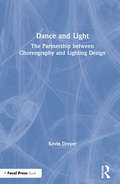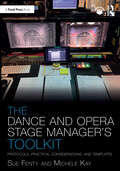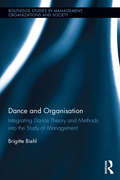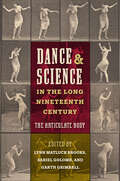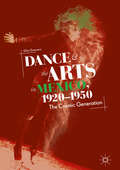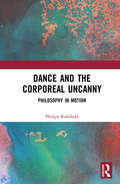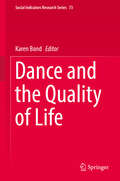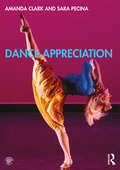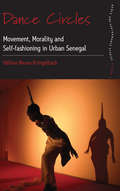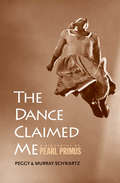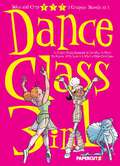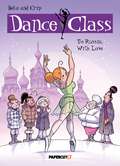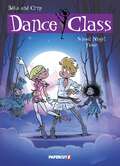- Table View
- List View
Damn Glad to Meet You: My Seven Decades in the Hollywood Trenches
by Tim Matheson&“I found myself underlining and highlighting things to remember for my own career. It&’s also entertaining—a great combination. Tim&’s words encourage you to keep dreaming.&”--Reba McEntire &“Tim was a cast, crew, and audience favorite on The West Wing. He&’s been at the center of some of America&’s most iconic film and television. Damn Glad to Meet You is a fascinating, hilarious, and often very moving inside look at his extraordinary career.&”--Aaron Sorkin A &“damn good&” fun and revealing memoir from the acclaimed Hollywood actor, Tim Matheson For the past seven decades, Tim Matheson has been an on-screen favorite in Hollywood. In his debut memoir, Tim takes fans behind-the-scenes of his illustrious career, and reveals what it was like to learn from and work alongside the greats, including Lucille Ball, Dick Van Dyke, Steven Spielberg, and Aaron Sorkin. Tim also talks about how he transitioned from acting to directing, the role in The West Wing that nabbed him two Emmy nominations–and so much more. Filled to the brim with both riveting stories of the ever-changing entertainment industry and illuminating insight via &“film school boot camp&” sidebars, readers everywhere are going to be &“damn glad&” they read this fascinating memoir.
Damn Shame: A Memoir of Desire, Defiance, and Show Tunes
by David PevsnerA funny, daring, bawdy and incredibly honest memoir from the anti-ageist, anti-body shaming, pro-sex advocate and erotic provocateur.Over the course of his 40-year career in show business, David Pevsner has done it all. He&’s acted on Broadway, off-Broadway, in independent films and on numerous TV network shows including Grey&’s Anatomy, Modern Family and Criminal Minds. As he continues his career in entertainment, Pevsner has also dedicated himself to exploring his deepest sexual fantasies. In his late 30s he became a mature male escort and over the last several years has attracted a large international fan base through his blog of erotic photographs celebrating nudity and sexuality. Damn Shame is David Pevsner&’s incredible story and is a passionate and poignant look at one man&’s journey from a thin, shy boy ashamed of his body and sexuality to a defiant, fearless everyman exploring his erotic desires, everything from leather and S&M to nude/erotic/hardcore modelling. Along the way, he fights back against society&’s demonization of gay sex, body shaming and ageism while pursuing his own very personal definition of success and seeking love, validation and self-esteem. Damn Shame gives a loud and powerful voice to a generation of mature men who have been conditioned to believe from society (and especially younger members of the gay community) that they are sexually irrelevant, old and undesirable. Pevsner&’s life story goes in directions that many couldn&’t imagine, but the lessons learned through his experiences will resonate with readers of every age.
The Damned (Constellations)
by Nick RiddleThe Damned (1963) is the most intriguing of director Joseph Losey’s British "journeyman" films. A sci-fi film by a director who hated sci-fi; a Hammer production that sat on the shelf for over two years before being released with almost no publicity as the second half of a double bill. Losey was a director vocal in his dislike of depictions of physical violence, but he often made films that radiate an energy produced by a violent clash of elements. The Damned catches a series of collisions—some of them inadvertent—and traps them as if in amber. Its volatile elements include Losey the blacklisted director, Hammer the erratic British studio, Oliver Reed the 'dangerous' young actor, and radioactive children. Nick Riddle’s contribution to the Constellations series concentrates on historical and cultural context, place, genre, and other themes in order to try to make sense of a fascinating, underappreciated film.
Damsels and Divas: European Stardom in Silent Hollywood
by Agata FrymusDamsels and Divas investigates the meanings of Europeanness in Hollywood during the 1920s by charting professional trajectories of three movie stars: Pola Negri, Vilma Bánky and Jetta Goudal. It combines the investigation of American fan magazines with the analysis of studio documents, and the examination of the narratives of their films, to develop a thorough understanding of the ways in which Negri, Bánky and Goudal were understood within the realm of their contemporary American culture. This discussion places their star personae in the context of whiteness, femininity and Americanization. Every age has its heroines, and they reveal a lot about prevailing attitudes towards women in their respective eras. In the United States, where the stories of rags-to-riches were especially potent, stars could offer models of successful cultural integration.
Dan Duryea: Heel with a Heart (Hollywood Legends Series)
by Mike PerosDan Duryea (1907–1968) made a vivid impression on moviegoers with his first major screen appearance as the conniving Leo Hubbard in 1941's classic melodrama The Little Foxes. His subsequent film and television career would span from 1941 until his death. Duryea remains best known for the nasty, scheming villains he portrayed in such noir masterpieces as Scarlet Street, Criss Cross, and The Woman in the Window. In each of these, he wielded a blend of menace, sleaze, confidence, and surface charm. This winning combination led him to stardom and garnered him the adoration of female fans, even though Duryea's onscreen brutality so often targeted female characters. Yet this biography's close examination of Duryea's oeuvre finds him excelling in various roles in many genres—war films, westerns, crime dramas, and even the occasional comedy. Dan Duryea: Heel with a Heart is a full-scale, comprehensive biography that examines the tension between Duryea's villainous screen image and his Samaritan personal life. At home, he proved to be one of Hollywood's most honorable and decent men. Duryea remained married to the former Helen Bryan from 1931 until her death in 1967. A dedicated family man, he and Helen took an active role in raising their children and in the community. In his career, Duryea knew villainous roles were what the public wanted—there would be a public backlash if fans read an article depicting what a decent guy he was. Frustrated that he couldn't completely shake his screen image and public persona, he wrestled with this restriction throughout his career. Producers and the public did not care to follow any new directions he hoped to pursue. This book, written with Duryea's surviving son Richard's cooperation, fully explores the life and legacy of a Hollywood icon ready for rediscovery.
Dan Graham: Rock My Religion (One Work)
by Kodwo EshunAn illustrated exploration of a groundbreaking work and its connections to New York's art and music scenes of the 1980s.Dan Graham's Rock My Religion (1982–1984) is a video essay populated by punk and rock performers (Patti Smith, Jim Morrison, Jerry Lee Lewis, and Eddie Cochran) and historical figures (including Ann Lee, founder of the Shakers). It represented a coming together of narrative voice-overs, singing and shouting voices, and jarring sounds and overlaid texts that proposed a historical genealogy of rock music and an ambitious thesis about the origins of North America's popular culture. Because of its passionate embrace of underground music, its low-fi aesthetics, interest in politics, and liberal approach to historiography, the video has become a landmark work in the history of contemporary moving image and art; but it has remained, possibly for the same reasons, one of Graham's least written about works—underappreciated and possibly misunderstood by the critics who otherwise celebrate him. This illustrated study of Graham's groundbreaking work fills that critical gap.Kodwo Eshun examines Rock My Religion not only in terms of contemporary art and Graham's wider body of work but also as part of the broader culture of the time. He explores the relationship between Graham and New York's underground music scene of the 1980s, connecting the artistic methods of the No Wave bands—especially their group dynamics and relationship to the audience—and Rock My Religion's treatment of working class identity and culture.
A Dance
by Alexander BarabanovAlexander Barabanov, a key figure in the Russian dance world, has sifted through many thousands of photographs of dance to accumulate an extraordinary collection of pictures, ranging from historical ballet photographs to shocking avant-garde imagery.This work has been collected and edited to form an astonishing sequence. Rather than being assembled as an anthology, the sequence has in fact been 'choreographed' so the book is constructed to form a dance in ten movements. It begins with creation myths, follows erotic engagements and leads to a series of mass movements in the modern age. It includes such gems as the young Nureyev's first performance with the Kirov and Baryshinikov's debut as well as images with brutal reference to Abu Ghraib or the march of fascism.
The Dance (The Dark Chronicles #1)
by Barbara SteinerIs there something sinister about Madame Leona&’s dance troupe?When Melanie Clark&’s best friend, Pauline, dies in a car crash, the police write it off as an accident, but Melanie isn&’t so sure. Pauline was acting strange in the weeks before she died, and Melanie believes Pauline&’s dance teacher, Madame Leona, may have had something to do with that. In order to learn more about the mysterious hold Madame Leona has on her students, Melanie joins the teacher&’s prestigious dance group. She&’s determined to find out the truth behind Pauline&’s death—no matter what it takes. But as she becomes more involved, Melanie starts to forget why she joined in the first place, falling deeper and deeper under Madame Leona&’s spell. Can Melanie escape the woman&’s magnetic grip, or has she lost herself forever?
Dance, Access and Inclusion: Perspectives on Dance, Young People and Change
by Charlotte Svendler Nielsen Stephanie BurridgeThe arts have a crucial role in empowering young people with special needs through diverse dance initiatives. Inclusive pedagogy that integrates all students in rich, equitable and just dance programmes within education frameworks is occurring alongside enabling projects by community groups and in the professional dance world where many high-profile choreographers actively seek opportunities to work across diversity to inspire creativity. Access and inclusion is increasingly the essence of projects for disenfranchised and traumatised youth who find creative expression, freedom and hope through dance. This volume foregrounds dance for young people with special needs and presents best practice scenarios in schools, communities and the professional sphere. International perspectives come from Australia, Brazil, Cambodia, Canada, Denmark, Fiji, Finland, India, Indonesia, Jamaica, Japan, Malaysia, New Zealand, Norway, Papua New Guinea, Portugal, Singapore, South Africa, Spain, Taiwan, Timor Leste, the UK and the USA. Sections include: inclusive dance pedagogy equality, advocacy and policy changing practice for dance education community dance initiatives professional integrated collaborations
Dance Anatomy (Anatomy Ser.)
by Jacqui Greene HaasDance Anatomy is a visually stunning presentation of more than 100 of the most effective dance, movement, and performance exercises, each designed to promote correct alignment, improved placement, proper breathing, and prevention of common injuries.
Dance and Cultural Difference in Aotearoa: Finding Common Ground in Rural Dance Studio Education (Critical Studies in Dance Leadership and Inclusion)
by Kristie MortimerThis book provides a critical reflection on the ways dance studio teachers recognize, reflect and respond to cultural difference within their dance studio classes, particularly in the rural context in Aotearoa/New Zealand. Through dance teachers’ narratives, it reveals the complexities of multiculturalism within dance studio classes and examines related issues of inclusion and exclusion within dance education.Understanding the dance practices provided by teachers like those in rural communities within Aotearoa/New Zealand is an increasingly urgent concern in an era of growing political, social and cultural tensions, for students and scholars of performing arts, leadership and community development. While previous research and publications have investigated cultural difference and global multicultural arts practices, this book presents a critical lens on performing arts practice and socio-cultural challenges experienced by local dance teachers within rural communities in Aotearoa/New Zealand.
Dance and Gender: An Evidence-Based Approach
by Wendy Oliver Doug RisnerDriven by exacting methods and hard data, this volume reveals gender dynamics within the dance world in the twenty-first century. It provides concrete evidence about how gender impacts the daily lives of dancers, choreographers, directors, educators, and students through surveys, interviews, analyses of data from institutional sources, and action research studies. Dancers, dance artists, and dance scholars from the United States, Australia, and Canada discuss equity in three areas: concert dance, the studio, and higher education. The chapters provide evidence of bias, stereotyping, and other behaviors that are often invisible to those involved, as well as to audiences. The contributors answer incisive questions about the role of gender in various aspects of the field, including physical expression and body image, classroom experiences and pedagogy, and performance and funding opportunities. The findings reveal how inequitable practices combined with societal pressures can create environments that hinder health, happiness, and success. At the same time, they highlight the individuals working to eliminate discrimination and open up new possibilities for expression and achievement in studios, choreography, performance venues, and institutions of higher education. The dance community can strive to eliminate discrimination, but first it must understand the status quo for gender in the dance world. Wendy Oliver, professor of dance at Providence College, is coeditor of Jazz Dance: A History of the Roots and Branches. Doug Risner, professor of dance at Wayne State University, is coeditor of Hybrid Lives of Teaching Artists in Dance and Theatre Arts: A Critical Reader. Contributors: Gareth Belling | Karen Bond | Carolyn Hebert | Eliza Larson | Pamela S. Musil | Wendy Oliver | Katherine Polasek | Doug Risner | Emily Roper | Karen Schupp | Jan Van Dyke
Dance and Light: The Partnership Between Choreography and Lighting Design
by Kevin DreyerDance and Light examines the interconnected relationship between movement and design, the fluid partnership that exists between the two disciplines, and the approaches that designers can take to enhance dance performances through lighting design. The book demystifies lighting for the dancer and helps designers understand how the dancer/choreographer thinks about their art form, providing insight into the choreographer’s process and exploring how designers can make the most of their resources. The author shares anecdotes and ideas from an almost 50-year career as a lighting designer, along with practical examples and insights from colleagues, and stresses the importance of clear communication between designers, choreographers, and dancers. Attention is also given to the choreographer who wants to learn what light can do to help enhance their work on stage. Written in short, stand-alone chapters that allow readers to quickly navigate to areas of interest, Dance and Light is a valuable resource for lighting design classes wishing to add a section on dance lighting, as well as for choreography classes who want to better equip young artists for a significant collaborative partnership.
The Dance and Opera Stage Manager's Toolkit: Protocols, Practical Considerations, and Templates (The Focal Press Toolkit Series)
by Susan Fenty Studham Michele KayThe Dance and Opera Stage Manager’s Toolkit details unique perspectives and approaches to support stage managers beginning to navigate the fields of dance and opera stage management in live performance.This book demystifies the genre-specific protocols and vocabularies for stage managers who might be unfamiliar with these fields and discusses common practices. Filled with valuable industry-tested tools, templates, and practical information, The Dance and Opera Stage Manager’s Toolkit is designed to assist stage managers interested in pursuing these performance genres. The book also includes interviews and contributions from a range of professional stage managers working in dance and opera.From the student stage manager studying in Theatrical Design and Production university programs to the experienced stage manager wanting to broaden their skill set, this book provides resources and advice for a successful transition into these worlds.The Dance and Opera Stage Manager’s Toolkit includes access to an online repository of resources and paperwork examples to help jumpstart the reader’s journey into dance and opera stage management. To access these resources, visit www.routledge.com/9780367566579.
Dance and Organization: Integrating Dance Theory and Methods into the Study of Management (Routledge Studies in Management, Organizations and Society)
by Brigitte BiehlDance and Organisation is the first comprehensive work to integrate dance theory and methods into the study of management, which have developed an interest in the arts and the humanities. Dance represents dynamics and change and puts the moving body at the centre, which has been ignored and oppressed by traditional management theory. ‘Being’ a leader however also means to ‘move’ like one, and critical lessons can be learned from ballerinas and modern dancers. Leadership is a dialogue, as in the work of musicians, conductors and DJs who manage groups without words. Movement in organisational space, in a museum or a techno club can be understood as a choreography and site-specific performance. Movement also is practically used for leadership and employee development workshops and can be deployed as an organisational research method. By taking a firm interdisciplinary stance in dance studies and organisational research to explore management topics, reflecting on practitioner accounts and research projects, the book seeks to make an innovative contribution to our understanding of the moving body, generating new insights on teamwork, leadership, gender in management, organisational space, training and research methods. It comprises an important contribution to the organizational behaviour and critical management studies disciplines, and looks to push the boundaries of the academic literature.
Dance and Science in the Long Nineteenth Century: The Articulate Body
by Lynn Matluck Brooks Sariel Golomb Garth GrimballRevealing the interplay and influence of dance and science during an age of colonial expansion Bringing together dance and science, two paradigms that explore the nature and possibilities of the body, this volume illuminates the meanings and articulations of dance in nineteenth-century societies. This global collection of studies reveals how the two fields informed each other’s development and engaged with dominant European worldviews in a time of unprecedented colonial expansion. The chapters in Dance and Science in the Long Nineteenth Century examine how trends and developments in the performing arts reflected scientific thinking of this era, including the categorization of “types” of bodies and the ranking of cultural and religious beliefs, as well as how dance served as an active site of inquiry where the workings and limits of the human body could be studied. Researchers discuss topics including the influence of plant biology on the aesthetics of ballet, technological advancements in the staging and recording of performances, arguments for the use of Eurhythmics in promoting a stronger “race,” and European fascination with Indian dance and yoga. Featuring response essays that put leading scholars in conversation with one another and offer new perspectives, this volume is unique in its geographic scope and its discussion of diverse bodies, cultures, themes, and scientific disciplines. It sheds light on a historical interplay that has shaped many of today’s political and cultural realities.Contributors: Johanna Pitetti-Heil | Chantal Frankenbach | Jane Desmond | Christian Ducomb | Claudia Jeschke | Kélina Gotman | Pallabi Chakravorty | Andrea Harris | Dick McCaw | Stephen Ha | Emily Coates | Tiziana Leucci | Elizabeth Claire | Susan Cook | Carrie Streeter | Olivia Sabee | Janice Ross | Alexander H. Schwan | Whitney Laemmli
Dance and the Arts in Mexico, 1920-1950: The Cosmic Generation
by Ellie GuerreroDance and the Arts in Mexico, 1920–1950 tells the story of the arts explosion that launched at the end of the Mexican revolution, when composers, choreographers, and muralists had produced state-sponsored works in wide public spaces. The book assesses how the “cosmic generation” in Mexico connected the nation-body and the dancer’s body in artistic movements between 1920 and 1950. It first discusses the role of dance in particular, the convergences of composers and visual artists in dance productions, and the allegorical relationship between the dancer's body and the nation-body in state-sponsored performances. The arts were of critical import in times of political and social transition, and the dynamic between the dancer’s body and the national body shifted as the government stance had also shifted. Second, this book examines more deeply the involvement of US artists and patrons in this Mexican arts movement during the period. Given the power imbalance between north and south, these exchanges were vexed. Still, the results for both parties were invaluable. Ultimately, this book argues in favor of the benefits that artists on both sides of the border received from these exchanges.
Dance and the Corporeal Uncanny: Philosophy in Motion
by Philipa RothfieldDance and the Corporeal Uncanny takes the philosophy of the body into the field of dance, through the lens of subjectivity and via its critique. It draws on dance and performance as its dedicated field of practice to articulate a philosophy of agency and movement. It is organized around two conceptual paradigms - one phenomenological (via Merleau-Ponty), the other an interpretation of Nietzschean philosophy, mediated through the work of Deleuze. The book draws on dance studies, cultural critique, ethnography and postcolonial theory, seeking an interdisciplinary audience in philosophy, dance and cultural studies.
Dance and the Quality of Life (Social Indicators Research Series #73)
by Karen BondThis is the first volume devoted to the topic of dance and quality of life. Thirty-one chapters illuminate dance in relation to singular and overlapping themes of nature, philosophy, spirituality, religion, life span, learning, love, family, teaching, creativity, ability, socio-cultural identity, politics and change, sex and gender, wellbeing, and more. With contributions from a multi-generational group of artists, community workers, educators, philosophers, researchers, students and health professionals, this volume presents a thoughtful, expansive-yet-focused, and nuanced discussion of dance’s contribution to human life. The volume will interest dance specialists, quality of life researchers, and anyone interested in exploring dance’s contribution to quality of living and being.
Dance Appreciation
by Amanda Clark Sara PecinaDance Appreciation is an exciting exploration of how to understand and think about dance in all of its various contexts. This book unfolds a brief history of dance with engaging insight into the social, cultural, aesthetic, and kinetic aspects of various forms of dance. Dedicated chapters cover ballet, modern, tap, jazz, and hip-hop dance, complete with summaries, charts, timelines, discussion questions, movement prompts, and an online companion website all designed to foster awareness of and appreciation for dance in a variety of contexts. This wealth of resources helps to uncover the fascinating history that makes this art form so diverse and entertaining, and to answer the questions of why we dance and how we dance. Written for the novice dancer as well as the more experienced dance student, Dance Appreciation enables readers to learn and think critically about dance as a form of entertainment and art.
Dance Circles
by Helene Neveu KringelbachSenegal has played a central role in contemporary dance due to its rich performing traditions, as well as strong state patronage of the arts, first under French colonialism and later in the postcolonial era. In the 1980s, when the Senegalese economy was in decline and state fundingwithdrawn, European agencies used the performing arts as a tool in diplomacy. This had a profound impact on choreographic production and arts markets throughout Africa. In Senegal, choreographic performers have taken to contemporary dance, while continuing to engage with neo-traditional performance, regional genres like the sabar, and the popular dances they grew up with. A historically informed ethnography of creativity, agency, and the fashioning of selves through the different life stages in urban Senegal, this book explores the significance of this multiple engagement with dance in a context of economic uncertainty and rising concerns over morality in the public space.
The Dance Claimed Me: A Biography of Pearl Primus
by Murray Schwartz Peggy SchwartzPearl Primus (1919-1994) blazed onto the dance scene in 1943 with stunning works that incorporated social and racial protest into their dance aesthetic. In The Dance Claimed Me, Peggy and Murray Schwartz, friends and colleagues of Primus, offer an intimate perspective on her life and explore her influences on American culture, dance, and education. They trace Primus's path from her childhood in Port of Spain, Trinidad, through her rise as an influential international dancer, an early member of the New Dance Group (whose motto was "Dance is a weapon"), and a pioneer in dance anthropology. Primus traveled extensively in the United States, Europe, Israel, the Caribbean, and Africa, and she played an important role in presenting authentic African dance to American audiences. She engendered controversy in both her private and professional lives, marrying a white Jewish man during a time of segregation and challenging black intellectuals who opposed the "primitive" in her choreography. Her political protests and mixed-race tours in the South triggered an FBI investigation, even as she was celebrated by dance critics and by contemporaries like Langston Hughes. For The Dance Claimed Me, the Schwartzes interviewed more than a hundred of Primus's family members, friends, and fellow artists, as well as other individuals to create a vivid portrayal of a life filled with passion, drama, determination, fearlessness, and brilliance.
Dance Class 3-In-1 Vol. 2: "A Funny Thing Happened On The Way To Paris…," "To Russia, With Love," And "A Merry 'Olde Christmas" (Dance Class Graphic Novels #2)
by BekaThree complete adventures filled with action, romance, humor, and plenty of dance numbers. Julie, Lucie, and Alia are best friends and share the same passion: dance! Practicing nonstop, they&’re training hard to get into the Nationals. These three will have to balance competition, relationships, classes, and practice without letting things get out of hand. Complicating matters is their fellow student Carla, who would do just about anything to steal the spotlight – if Julie, Lucie, and Alia let her, that is. Join the young dancers as they dance across the globe, from Russia to London, in three thrilling adventures: &“A Funny Thing Happened on the Way to Paris…,&” &“To Russia, With Love,&” and &“A Merry Olde Christmas&”!
Dance Class Vol. 5: To Russia, With Love (Dance Class Graphic Novels #5)
by BekaWhen Julie, Lucy, and Alia sign up for rock the new style brings a lot of new lessons, not the least of which is that cute boys don't necessarily make good dance partners. And the girls can't forget their ballet skills, not when Miss Anne has the whole troupe performing The Nutcracker . . . in Russia! Carla, jealous as always, is intent on ruining the show; the girls may need some help from an unexpected place to pull it off this time!
Dance Class Vol. 7: School Night Fever (Dance Class Graphic Novels #7)
by BekaThe national competition is coming up fast, and Julie, Lucie, and Alia will need all their skills, all their poise, and a lot of grit and determination to get their routine in perfect shape.The always jealous, ever-scheming Carla is trying to sabotage everything again, but the girls are used to that; what they weren't expecting was their teacher, Mary, falling sick at the worst possible moment! As they struggle to choreograph something on their own for the first time, it may be up to Lucie to step up and save the day.
